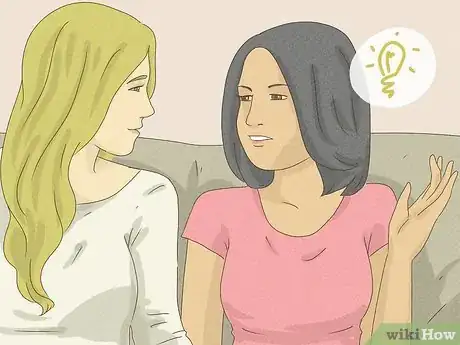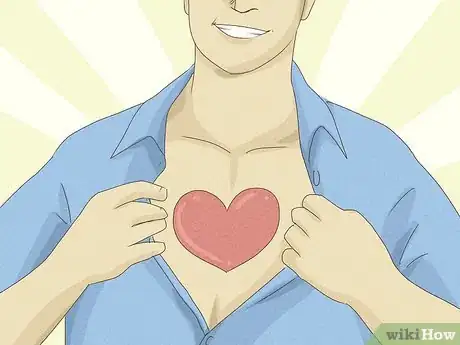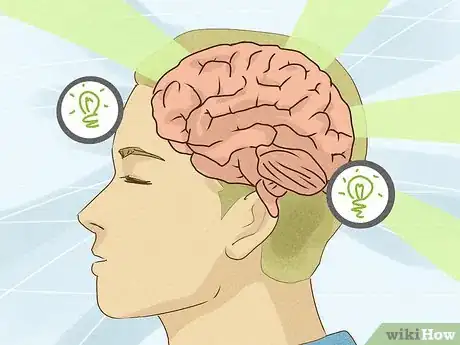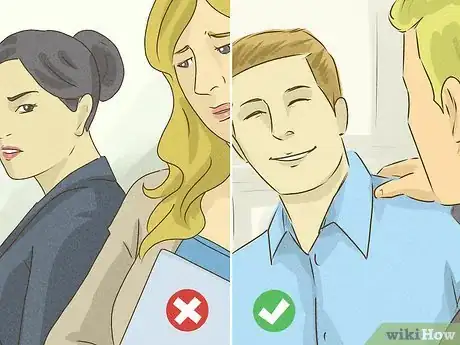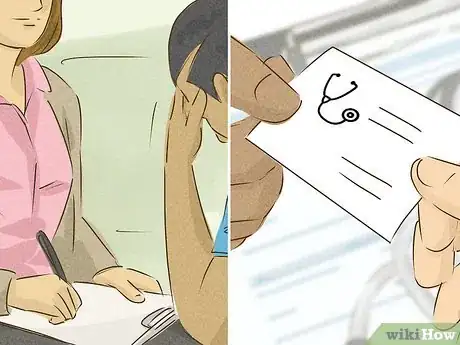This article was co-authored by Jennifer Butler, MSW. Jennifer Butler is a Love & Transformation Coach and the Owner of JennJoyCoaching, a life coaching business based in Miami, Florida, although Jennifer works with clients all over the world. Jennifer’s work centers around empowering women who are navigating any stage of the divorce or breakup process. She has over four years of life coaching experience. She is also the co-host of the Deep Chats Podcast along with Leah Morris and the host of season 2 “Divorce and Other Things You Can Handle” by Worthy. Her work has been featured in ESME, DivorceForce, and Divorced Girl Smiling. She received her Masters of Social Work (MSW) from New York University. She is also a Certified Health Coach, a Communications & Life Mastery Specialist, and a Certified Conscious Uncoupling and Calling in “the One” coach.
There are 14 references cited in this article, which can be found at the bottom of the page.
wikiHow marks an article as reader-approved once it receives enough positive feedback. In this case, 89% of readers who voted found the article helpful, earning it our reader-approved status.
This article has been viewed 174,141 times.
Being an "open person" can mean many different things, all of them positive. It's a term with no set definition, but it generally includes some combination of friendliness, approachability, honesty, open-mindedness, tolerance, and personal authenticity. Open people tend to be more happy, charismatic, likable, and successful compared to people who are "closed off." While some people are open by nature, others can learn to be more open with practice and a little mindfulness.
Steps
Expressing Yourself
-
1Be honest. Some people are closed off through deception. They have a habit of lying to tell everyone around them what they think they want to hear. This closes them off completely, since nobody knows who they really are. To be open, do your best to be honest about yourself and your opinions.
- Speak your mind, but try not to do it in a hurtful way. Being negative can also make you seem less open. For example, if you dislike a band, you might say "They're not my thing" instead of "They're horrible."
- Remember that sometimes it's appropriate to be tactful, especially when it comes to people you're close to but not by choice, such as family and coworkers. Keep your feelings about controversial topics vague if you're among people who may think them offensive.
-
2Let people know what you think. Don't be afraid to show your authentic self. Being an open person means keeping up open communication with people you care about. If something is on your mind, talk to a friend or loved one about it.
- Let people know when something is bothering you. It's sometimes tempting to "go with the flow," but speaking up is often the only way to improve a situation.
- Avoid suppressing your emotions, which can be dangerous to both your emotional health and to the relationship you may be trying to preserve. Be open with how you feel and let that extend to your facial expressions. People who are more expressive tend to be perceived as more likable and trustworthy.[1]
- If you're in a relationship where things feel more rigid than you'd like, be more silly and free and carefree if that feels authentic to you.[2]
Advertisement -
3Don't wall off important aspects of yourself. It's important to be yourself and to understand that people need to know who you are. Don't be too guarded about your experiences, likes, and dislikes. Don't hide who you are without a good reason.
- Many closed-off people have trouble when it comes to something called self-disclosure. Self-disclosure is simply talking about yourself. Self-disclosure about embarrassing or painful topics is difficult for most people, but it also helps to strengthen interpersonal relationships.
- On the other hand, some people are so closed-off that it's difficult for them to mention details about themselves that most people talk about freely. Don't be afraid to mention your favorite book or what you do for a living. If people are going to judge you for it, should you really care what they think?[3]
- This doesn't mean you should be an open book at all times. Be selective about who you share yourself with, especially if your livelihood and safety is on the line.
-
4Let yourself be vulnerable. In order to really be open and be yourself, you must allow yourself to be vulnerable. This means being able to reveal your fears, desires, and beliefs to both yourself and others, despite any fear of being judged or rejected. While being vulnerable may be scary at first, it will ultimately help you form deeper connections with others and feel more free to be yourself.[4]
- For example, being vulnerable might mean opening up to a friend about a painful experience in your past, or telling your significant other that you want them to say “I love you” more often.
- If you are craving affection, find people to give affection to. If you want to be hugged, hug somebody.[5]
-
5Practice self-disclosure more often. Self-disclosure builds trust because, in a way, you make yourself a little vulnerable to the other person. Because of this, self-disclosure can be very difficult, especially for people who have been hurt in the past. If you have trouble with self-disclosure, try going slowly at first before becoming very open.
- Start by being open about things few adults would judge you about. If you dislike a movie you just saw, say so. If a friend asks you what type of music you like, feel free to share.
- Once you've gotten used to being open about surface matters, you can start talking about more personal topics. This includes things like your spirituality, political views, life philosophy, and personal feelings about others. For some, it may also include health problems, sexual orientation, and gender identity. For many people, it's normal to keep this type of self-disclosure to conversations with friends and family.
- For very serious intimate relationships, you may even choose to share painful things about your past. This form of self-disclosure can help heal past trauma.[6]
-
6Know whom you should trust. On the other hand, there is such a thing as being too open about yourself. Too much self-disclosure can be detrimental to your life or simply turn people off. Knowing when intimate self-disclosure is appropriate is mostly a gut feeling, but there are still a few things to keep in mind.
- Always get to know people before disclosing any information you aren't comfortable with being public. Spending time with them is the best way to figure out whether or not they're trustworthy.
- Keep yourself on roughly equal footing. A simple way of gauging appropriate levels of self-disclosure is by paying attention to what the other person shares with you and matching it. Of course, if you stayed completely equal, you'd never move closer. Just be sure what you're sharing is only slightly more personal than what the other person has told you.[7]
- In general, it's a good idea to keep your self-disclosure at work at the surface level. This is especially important if you manage people. Some types of self-disclosure make others uncomfortable and your employees may jump to conclusions. If you disclosure certain things like your religious beliefs or political opinions, your employees may think they're being discriminated against. This hurts productivity and may even open your company up to a lawsuit.[8]
Reaching out to Others
-
1Learn to be more open-minded. Part of being an open person is being receptive to new ideas and experiences. This will help you relate to a wider range of people.
- Get out of your comfort zone and try new things, even when you don't think you'll like them.
- Sometimes your tastes change. Give some things another shot after a few years. If you're convinced that you hate Brussels sprouts but you haven't had them since you were 5, go ahead and try a bit of that dish your coworker brought in.
- Don't make snap judgments. Try your best to give everything a fair, unbiased look before rejecting it. You never know when your presumptions may be misinformed.[9]
- Being open-minded doesn't mean you have to accept everything uncritically. Feel free to trust your judgment if something still doesn't seem right after you've learned enough about it.
-
2Stop being judgmental of others. In some ways, this goes hand in hand with being more open-minded. Always remember that people have their own experiences, beliefs, and preferences that are often very different from yours. You can't tell a person's life story from their appearance or even 1 conversation.
- Always treat others with respect, no matter who they are. Try to put yourself in other people's shoes and treat them how you would want to be treated in that situation.
- You never know what relationships and opportunities you miss out on just by being a little too judgmental at the wrong time.
- Remember that when you're quick to judge others, they'll be just as quick to judge you.[10]
-
3Ask questions. Connect to other people by asking questions and genuinely listening to their answers. People who ask questions frequently in a conversation appear more friendly and available than people who don't. Ask questions that will encourage openness in others.
- Asking questions is the best way to learn new things.
- When asked personal questions, people are likely to reciprocate with a similar question, giving you the opportunity to practice honest self-disclosure.
- Asking questions can also be a method of being more open-minded and less judgmental of others. The more questions you ask, the better you get to know a person. The better you get to know someone, the less likely you'll be to judge.
- If someone doesn't answer your question directly, tell them something about yourself as if you were asked that question. Being open encourages the people around you to open up themselves.[11]
Understanding Yourself
-
1Think about why you may be considered closed off. A lot of people act in ways that show disinterest and dislike without even realizing it. Figure out if there's anything that you do—or don't do—that may make you seem closed off, and try doing the opposite to look more open.
- Are you shy and quiet? Unfortunately, shyness is often misinterpreted by others as arrogance.[12] Try to turn this assumption around by talking to people more often.
- What's your body language like? Many people look closed off without meaning to be. When you cross your arms, fidget, slouch, avoid eye contact, or rarely smile, you look less approachable to other people.[13]
-
2Consider talking to a professional. Sometimes people aren't open due to negative past experiences, chemical imbalances, or neurological disorders. While self-help may work for some issues, others require the help of professionals to resolve.
- Depending on your problem, you may talk to a counselor, a therapist, your primary care physician, a psychiatrist, or some combination thereof.
- If you're having trouble opening up due to a fear of social situations, you may have social anxiety.
- Certain mental illnesses, neurodevelopmental disorders, and neuromuscular diseases can affect your ability to communicate nonverbally, making looking more open difficult.[14]
- Some people may have trouble opening up because of past trauma or a lack of ability to trust others. A professional counselor can help you work through these issues and regain your ability to trust, allowing you to be more open.[15]
-
3Remember that there are many types of open people. You don't have to change the positive or neutral aspects of your personality just to be more open. If you're comfortable with yourself and have fulfilling interpersonal relationships, then you might already be an open person in your own way. There's nothing wrong with being who you are.
- If you're introverted, don't try to be extroverted. Since many cultures are biased towards extroverts, it may be tempting to force yourself into a more extroverted persona. However, this can lead to burnout and unhappiness over time. Instead, find the right balance of social interaction that makes you happy and stick with it.[16]
- If you're autistic, you're likely to have some trouble with typical nonverbal expression. You may want to learn how to do things like maintain appropriate eye contact and smile more often to help with social situations at school and work. Keep in mind that most people have to "perform" the same way on some level, even if it may come to them a little more naturally. Also, if you struggle with these things, don't beat yourself up over it. Just try your best.
Expert Q&A
Did you know you can get expert answers for this article?
Unlock expert answers by supporting wikiHow
-
QuestionHow do you open up emotionally?
 Jennifer Butler, MSWJennifer Butler is a Love & Transformation Coach and the Owner of JennJoyCoaching, a life coaching business based in Miami, Florida, although Jennifer works with clients all over the world. Jennifer’s work centers around empowering women who are navigating any stage of the divorce or breakup process. She has over four years of life coaching experience. She is also the co-host of the Deep Chats Podcast along with Leah Morris and the host of season 2 “Divorce and Other Things You Can Handle” by Worthy. Her work has been featured in ESME, DivorceForce, and Divorced Girl Smiling. She received her Masters of Social Work (MSW) from New York University. She is also a Certified Health Coach, a Communications & Life Mastery Specialist, and a Certified Conscious Uncoupling and Calling in “the One” coach.
Jennifer Butler, MSWJennifer Butler is a Love & Transformation Coach and the Owner of JennJoyCoaching, a life coaching business based in Miami, Florida, although Jennifer works with clients all over the world. Jennifer’s work centers around empowering women who are navigating any stage of the divorce or breakup process. She has over four years of life coaching experience. She is also the co-host of the Deep Chats Podcast along with Leah Morris and the host of season 2 “Divorce and Other Things You Can Handle” by Worthy. Her work has been featured in ESME, DivorceForce, and Divorced Girl Smiling. She received her Masters of Social Work (MSW) from New York University. She is also a Certified Health Coach, a Communications & Life Mastery Specialist, and a Certified Conscious Uncoupling and Calling in “the One” coach.
Life Coach
-
QuestionWhat should you do if you have a face that kind of remains expressionless, so people think you don't show interest in what they are saying?
 Paul Chernyak, LPCPaul Chernyak is a Licensed Professional Counselor in Chicago. He graduated from the American School of Professional Psychology in 2011.
Paul Chernyak, LPCPaul Chernyak is a Licensed Professional Counselor in Chicago. He graduated from the American School of Professional Psychology in 2011.
Licensed Professional Counselor
References
- ↑ pages.uoregon.edu/sanjay/pubs/suppression_personality_judgments.pdf
- ↑ Jennifer Butler, MSW. Love & Empowerment Coach. Expert Interview. 31 July 2020.
- ↑ http://www.succeedsocially.com/defensive
- ↑ https://greatist.com/live/fear-of-vulnerability
- ↑ Jennifer Butler, MSW. Love & Empowerment Coach. Expert Interview. 31 July 2020.
- ↑ http://oregonstate.edu/instruct/comm321/gwalker/relationships.htm
- ↑ https://www.psychologytoday.com/blog/the-young-and-the-restless/201108/disclose-yourself
- ↑ http://eeoc.gov/policy/docs/qanda_religion.html
- ↑ http://www.forbes.com/sites/davidkwilliams/2013/01/07/the-5-secret-tricks-of-great-people-how-to-become-open-minded-in-2013/#ffc59f13bb3d
- ↑ http://www.positivelypresent.com/2009/04/are-you-open-.html
- ↑ http://www.positivelypresent.com/2009/04/are-you-open-.html
- ↑ http://www.nytimes.com/2012/07/08/fashion/shyness-often-afflicts-unexpected-victims.html
- ↑ http://www.forbes.com/sites/keldjensen/2012/06/12/the-naked-truth-how-body-language-reveals-the-real-you/2/#57aa64bc6281
- ↑ http://www.aans.org/patient%20information/conditions%20and%20treatments/movement%20disorders.aspx
- ↑ https://www.psychologytoday.com/us/blog/compassion-matters/201803/dealing-unresolved-trauma
- ↑ http://www.huffingtonpost.com/2015/09/01/introvert-myths_n_3569058.html
About This Article
Being an open person can make you happier, more charismatic, and more successful. To be more open in life, be as honest as possible with people about your opinions and feelings. If you're polite about it, you'll be able to strengthen your relationships without hurting anyone's feelings. Try to be as genuine as possible so people can see you for who you really are. Start by being open about small things, like if you dislike a movie other people like or have an unusual hobby. Then, build up to being open about more personal things like your political and spiritual views. Try to keep an open mind yourself when discussing personal issues, which will encourage others to be open about you. Avoid judging people when you don’t like something about them, since they may have a backstory you don’t know about. For more tips from our co-author, including how to figure out who you can trust with personal information, read on!

